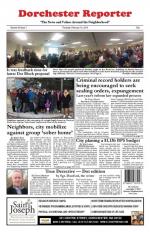May 9, 2013
For nearly all of the 20th century, the Boston Irish had a lock – even a stranglehold – on the office of mayor. Not until the outgoing Tom Menino followed Ray Flynn in the post was the near-monopoly of old sod descendants truly broken. Now, as the field to follow Menino takes shape for 2013, a trio of well-known locals with green bloodlines might possibly get back the job once held by the likes of James Michael Curley, John “Honey Fitz” Fitzgerald, John B. Hynes, Kevin White, and Flynn.
The Boston Irish contenders are City Councillor John R. Connolly, State Representative Martin J. Walsh, and Daniel F. Conley, the Suffolk District Attorney, a former city councillor from Hyde Park.
Only time will reveal if any of the triumvirate will be sitting where Menino still holds sway, or whether another local stalwart such as City Councillor Felix Arroyo wins, which would make him the first minority to win the mayor’s seat. Even if Connolly, Walsh, or Conley pull it off, demographics will make any new Boston Irish mayoral choke-hold unlikely in the future, and their chances for victory will not be as daunting as were those of the city’s first Irish mayor, Hugh O’Brien. O’Brien was not only of Boston, but also of Ireland itself. He was sworn in as the city’s first Irish-born mayor on Jan. 5, 1885. To many Yankees and Brahmins, his ascent represented a once unthinkable development in a region notable for its antipathy toward Irish Catholics.
O’Brien’s odyssey to the top of the heap in Boston politics began in 1832 when his parents emigrated from Ireland to Boston with their five-year-old son. He displayed a considerable intelligence early on, but was yanked from the city’s public school system as a twelve-year-old to work as an apprentice to a printer for the Boston Courier. A tradesman’s future beckoned the youth, lucky that he could escape the low-paying and insecure street sweeping or dockside work so many of his fellow Irish immigrants were forced to take. Young O’Brien, however, set his eyes on a far loftier future—one amid the rarefied circles of Yankee commerce.
Following his stint at the Courier, O’Brien took a slot at the private printing firm of Tuttle, Dennett and Chisholm on School Street, learning the ins and outs not only of printing but also of publishing his own paper, the Shipping and Commercial List. His publication proved a smash hit among Yankee merchants and Brahmin financiers who depended in any way upon the flow of goods and business news across Boston’s docks. The Irish Catholic had garnered quite a feat in making himself indispensable to well-heeled Protestants whose Back Bay and Beacon Hill brownstones generally meant only one thing to immigrants of “the old sod”—backbreaking work as maids or handymen. Brahmins who mocked “Paddy, the hopeless, witty Irishman, given to drink and quick to tears and laughter, who loved nothing more than ‘rows and ructions,’ and Bridget, the chaste and prudent but comically ignorant serving girl,” looked grudgingly at O’Brien in a different light. Many upscale sorts began to view him as an anomaly—one of the “good Irish.”
O’Brien’s business value to New England merchants and moguls notwithstanding, the question of how far the ambitious publisher could rise among what historian George Potter termed the “Irish-hating ice-cicles of Yankeeland” intrigued local Democratic leaders who ruled the city’s Irish neighborhoods. In 1875, the forty-nine-year-old businessman won election to Boston’s Board of Alderman, and the watchful eyes of the Irish community noticed when, over the next seven years, even hard-boiled Yankees lauded his “conscientious hard work.”
As a self-made man embracing New England traditions of industriousness and self-discipline, O’Brien belied the vicious stereotypes of “Paddy and Bridget” espoused by Brahmins inside their boardrooms, clubs and mansions and by Yankee tradesmen on construction sites and in local watering holes. The burgeoning Democratic luminaries of the Irish community first put O’Brien’s political palatability to Yankees to the test in late 1883 by nominating the publisher and alderman as the party’s mayoral candidate.
In the weeks before voters hit the polls, many Yankees recoiled against the notion of an Irish-born mayor. Then they attacked his character—but not with the ethnic “ammunition” many Bostonians expected. The Boston Transcript, the political conduit of conservative Protestants, did not assail O’Brien’s birthplace or his “Papist” religion, but raised allegations of his “junketeering” as an alderman.
On election night, the Irish turned out in force for their candidate, a man whose financial outlook shared more in common with his Protestant and Republican foe, Augustus Man, than with fellow immigrants. O’Brien lost the election, but by a narrow margin.
A year later, the name of Hugh O’Brien once again topped the Democratic mayoral ticket, and enough Yankee voters swallowed misgivings about an Irish-born candidate and helped the immigrant poor sweep him into office. His campaign platform of lower taxes and his demonstrated ability as an alderman to back that promise had proven a fiscal siren song too sweet to resist for many Brahmins.
Hugh O’Brien took the oath of office on January 5, 1885, heralding a new political era for Boston and for the region. He wasted little time in keeping his campaign promises of sound spending and lower taxes, worked to improve the city’s parks and roads and helped to lay the groundwork of the Boston Public Library, a site where even “Paddy and Bridget” would be allowed to read and study.
O’Brien would hold the office until 1889, winning reelection. Still, not until 1903, when Patrick Collins won the mayor’s race, would the Irish dominance of the job begin. Boston has changed greatly in the past two decades with other immigrant groups and minorities beginning to flex their rightful political muscle in the way that the ward bosses once did. Connolly, Walsh, or Conley might well win, but don’t expect another historical “green wave” washing over the mayor’s office.



